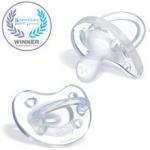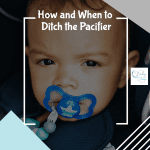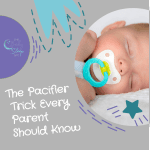 If you have a newborn, you might be asking ‘can baby sleep with a pacifier’? If you have an older baby or toddler, you might be asking ‘how to get baby sleeping without a pacifier’! Learn what you need to know about babies sleeping with a pacifier in this post.
If you have a newborn, you might be asking ‘can baby sleep with a pacifier’? If you have an older baby or toddler, you might be asking ‘how to get baby sleeping without a pacifier’! Learn what you need to know about babies sleeping with a pacifier in this post.
Is it ok for baby to sleep with a pacifier? Is it safe?
This is one of the most common questions for parents of newborns to ask. Is it safe for a baby to sleep with a pacifier?
Yes, it is safe and ok for a baby to sleep with a pacifier.
Pacifiers are very safe for sleep and can even reduce the risk of SIDS. Please check all of our safe sleep tips for more information. The CPSC has strict guidelines about pacifier production.
Can a Baby Sleep With a Pacifier All Night?
Yes, a baby can sleep with a pacifier all night as long as there aren’t any clips or strings that could become a hazard. It’s perfectly safe as that fits into one of the guidelines set forth by the CPSC. You should not have to remove the pacifier when baby is sleeping.
The CPSC’s “structural integrity” tests are designed to simulate realistic use and abuse from a child. There are physical and mechanical tests for this to ensure the pacifier will not break apart and lead to a choking hazard. Pacifiers are also designed with a guard so they cannot enter a baby’s mouth and block his or her throat. There are some pacifiers who actively support baby’s physiological breathing, too.
Should I Remove the Pacifier Once Baby is Sleeping?
No, it is unnecessary to remove the pacifier once your baby has fallen asleep. However, if you are concerned about causing a habit you have to later break, the pacifier doesn’t have to be left in all night. Keep in mind pacifiers have been shown to reduce the risk of SIDS. Most parents allow their babies to spit it out (or not).
Why Do Babies Like Pacifiers?
Babies like pacifiers because they have a strong sucking reflex that soothes them. This can be helpful during the witching hour when babies are fussy in the evening and in general. Pacifiers can sometimes work to calm babies with colic, too. And, finally, pacifiers can help babies fall asleep and stay asleep which is a major benefit for the entire family!
In addition, when a baby sucks on a pacifier, a hormone called Cholecystokinin (CCK) is released into the body. The CCK hormone helps aid digestion. For some babies, it seems to soothe their stomachs.
Are Pacifiers Bad For Breastfeeding?
No, pacifiers are not bad for breastfeeding, however, it’s VERY important not to introduce a pacifier until breastfeeding is fully established which is usually around 2-4 weeks old for babies without a latch issue. If your baby has a latch issue, be sure you wait until you resolve it.
The CCK hormone mentioned above also increases the sensation of short-term fullness so the body better digests food. So, if breastfeeding is not yet established, this can drastically, and negatively, impact your breast milk supply.
For formula-fed babies or babies getting breast milk solely from a bottle, you can start using a pacifier right away.
So, now that we’ve determined that your baby CAN use a pacifier. Does this mean all babies should use a pacifier? Just because a baby CAN sleep with a pacifier doesn’t mean they should. Or, should they?
Should Babies Sleep With Pacifiers?
Again, sleeping with a pacifier can reduce the risk of SIDS so for that reason alone, you might want to encourage a pacifier until at least 6 months old. In addition, pacifiers have been known to help babies with reflux.
However, while pacifiers are a God-send to some families since it helps a newborn sleep, they can cause a baby to wake up many times a night for you to put it back in. That can be exhausting for many parents!
Pacifiers become sleep associations which lead to baby waking at night and/or taking short naps.
In addition, pacifiers can cause teeth problems when used past the age of two years old though less than if they are finger- or thumb-suckers.
In an ideal world, if your baby has a strong need to suck and enjoys having a pacifier, you would teach them to find and replace it on their own. Obviously, newborns can’t do this until they can use their hands effectively. On average, in my experience, babies aren’t able to maneuver the pacifier on their own well enough until they are 5-8 months old. Some children never seem to do it even if they are fully capable. I’ve talked to some parents of toddlers who wake up at night and wait for their parents to pop the pacifier back in!
In the newborn days, you often “do what you gotta do” to get through the first 3-4 months of life. When your baby starts the 4 month sleep regression, this is a common time to consider stopping the use of the pacifier.
You May Also Be Interested In…
How to Stop Using a Pacifier
Once you start using a pacifier, unfortunately, it’s not always easy to stop using one. Babies become dependent on it, some more than others. I’ve worked with some babies who need the pacifier in 100% of the time when they’re sleeping. Some babies only use it for sleep and no other time. Still, others need it almost all day. And, finally, some babies only need it at the beginning of the night, spit it out in their sleep, and don’t need it anymore. Every baby is different.
If you are trying to stop using the pacifier, here are a couple of resources:
- The Pacifier Trick Every Parent Should Know
- How and When to Help Your Baby or Toddler Stop Using the Pacifier
I hope this post has helped ease your fears about using a pacifier for sleep!
You May Also Be Interested In:
References:
https://onlinelibrary.wiley.com/doi/full/10.1111/jpc.12402
https://www.ncbi.nlm.nih.gov/books/NBK534204/
https://www.hormone.org/your-health-and-hormones/glands-and-hormones-a-to-z/hormones/cholecystokinin
https://www.aafp.org/afp/2009/0415/p681.html
https://jada.ada.org/article/S0002-8177(16)30669-9/fulltext








